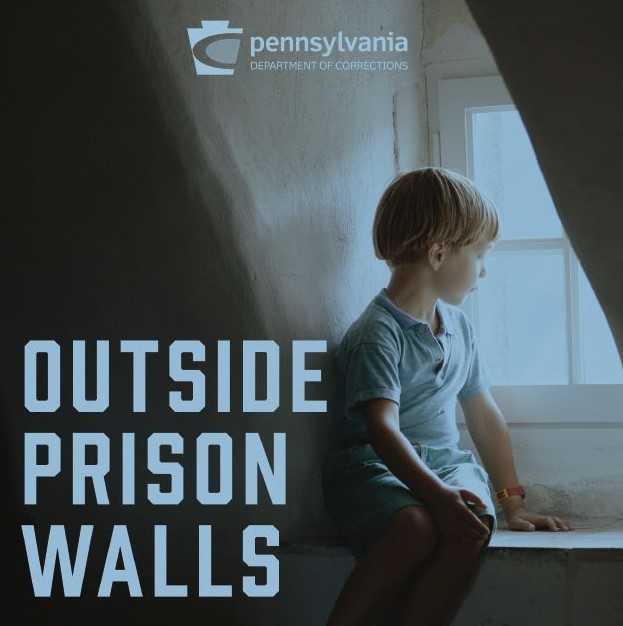CHILDREN OF IMPRISONED PARENTS
The hidden victims

BY SAMUEL HARTMAN
The impact of incarceration affects more than incarcerated people. Families left on the outside also suffer, and sadly children are rarely thought of when we think of prison ministry. Sadly sometimes these children are referred to as “the hidden victims”. This article will focus on the children and will summarize several sources that will be cited. I believe after you read what follows, you will agree this is a serious issue and we need to start a dialogue on how the church should and can react to aid these silent victims.
The effect on children of incarcerated parents.
Evidence suggests that having a parent incarcerated, can have many negative effects on the child. Later, because of space, I plan to put together an article focusing on those effects but for now, I will quote Joseph Murray’s publication from The Psychological Bulletin of the APA,
“Families and children of prisoners can experience multiple difficulties after parental incarceration, including traumatic separation, loneliness, stigma, confused explanations to children, unstable childcare arrangements, strained parenting, reduced income, and home, school, and neighborhood moves.” In addition, Murray claims, “10% increased risk for antisocial behavior among children with incarcerated parents, compared with peers.” [1]
How many children in pa have at least 1 parent incarcerated?
In a report on the COR website titled Children of Incarcerated Parents states, “Approximately 81,096 children have a parent incarcerated in a Pennsylvania state prison or roughly 3 percent of all minor children in the commonwealth. Approximately 65 percent of Pennsylvania state prison inmates have at least one child.” [2]
Notice the report does not include the number in the counties or federal facilities, so I researched how many people were incarcerated in those institutions…
https://www.cor.pa.gov/About%20Us/Statistics/Documents/Reports/2014%20Annual%20Statistical%20Report.pdf
According to the COR Annual Statistics Report 2014
As of calendar year-end 2014, the DOC population total was 50,756
https://www.vera.org/downloads/pdfdownloads/state-incarceration-trends-pennsylvania.pdf
Vera Institute of Justice states in the Incarceration Trends of Pennsylvania graphing approximately 33,000 were in county jails.
I can not locate this but will update when I find the source
Federal Prison Population in PA is difficult to pin down so I will use the number 7,500 from 2010
Pennsylvania Inactive Pennsylvania profile
If we added federal and county to the total population, it would not be unreasonable to estimate that 4-5% of children in PA have been affected. Keep that percentage in mind and realize 3% is 81,096 children in PA
estimated 108,128 – 136,160 children
Increased likelihood of children becoming incarcerated
In an article written by Eric Martin for the NIJ claims, “One statistic indicates that children of incarcerated parents are, on average, six times more likely to become incarcerated themselves.” [3]
Obviously the Martin did not fully read the paper he cited, otherwise he would have noticed;
Megan Cox, wrote, “The research literature affords little guidance for understanding the plight of students with incarcerated parents in American schools (Lopez & Bhat, 2007). Several scholars in the field have cited that children of prisoners are up to six times more likely
than their peers without an incarcerated parent to become prisoners themselves (Bilchik
et al., 2001; Jucovy, 2003, Martin, 2001). Although this statistic is seen widely throughout the literature, the original study resulting in this statistic cannot be found (Myers et al., 1999; Murray & Farrington, 2005; Ziebert, 2006), and therefore cannot be treated as fact.” [4]
To add to the question I include another paper by, James M. Conway, Ph.D. Edward T. Jones Department of Psychological Science, “It has been widely claimed without documentary evidence that children with incarcerated parents (CIP) are six times more likely than other children to become justice-involved” The authors conclude, “the “six times more likely” and “seven out of ten” claims are unsupported by the data” They did gather some anecdotal data that showed 3.28x’s from what they saw but again this is not an established fact and they also say that. [5]
Ultimately there is no conclusive number but whether a child is 3.25x’s or 6x’s more likely to become incarcerated themselves. Whatever the findings ultimately are, we should be concerned with. Setting aside the moral and ethical reasons to help, think of it helping to decrease the potential incarceration of future generations.
Conclusion
I know the information is overwhelming and abstract. I also know it’s hard to see numbers as the face of a child, but that’s exactly what is being represented here. I know there are those who are trying to help but I also believe it is time for a larger population to realize that prison ministry extends beyond the wall of the prison. At this time I have no answers in how to help but that’s where seeking out others who do and those who are willing. We need to start the conversation and devise a course of action and follow through with it.
The final charge to the church
Matthew 25:41–46 Jesus said, ‘For I was hungry, thirsty, stranger, naked, sick and in prison. You didn’t take care of me.’
We can pretend the problem doesn’t exist, but in reality, we choose not to see it… The crowd said, ‘Lord, when did we see you hungry, or thirsty, or a stranger, or without clothes, or sick, or in prison, and not help you?’ “Then he will answer them, ‘Truly I tell you, whatever you did not do for one of the least of these, you did not do for me.’
“And they will go away into eternal punishment, but the righteous into eternal life.”
Working with the people who are entangled criminal justice system may not be your “calling” or the area God wants you, but if you are a follower of Christ, you are CALLED individually and corporately, to serve those who are also made in the image of God and live on the margins of society.
Remember that we were once enemies (Romans 5:10) and alienated from God (Col 1:21) but Jesus emptied himself (Phil. 2:7) to come to us and we are to Go (Matt 28:19).
Citations
[1]
Psychol Bull. 2012 Mar; 138(2): 175–210.
Published online 2012 Jan 9. doi: 10.1037/a0026407
PMCID: PMC3283435
PMID: 22229730
Children’s Antisocial Behavior, Mental Health, Drug Use, and Educational Performance After Parental Incarceration: A Systematic Review and Meta-Analysis
By Joseph Murray the author, David P. Farrington, Ivana Sekol
[2]
From a release by the COR, Children of Incarcerated Parents
https://www.cor.pa.gov/family-and-friends/Pages/Children-of-Incarcerated-Parents.aspx
[3]
Eric Martin, “Hidden
Consequences: The Impact of Incarceration on
Dependent Children,” NIJ Journal 278, March
2017, https://nij.gov/journals/278/Pages/impact-ofincarceration-
on-dependent-children.aspx.
[4]
Megan Cox, The Relationships Between Episodes of Parental Incarceration and Students’ Psycho-Social and Educational Outcomes: An Analysis of Risk Factors (Philadelphia: Temple University, 2009).
[5]
Seven out of Ten – Not Even Close
James M. Conway, Ph.D. Edward T. Jones Department of Psychological Science, Central Connecticut State University
